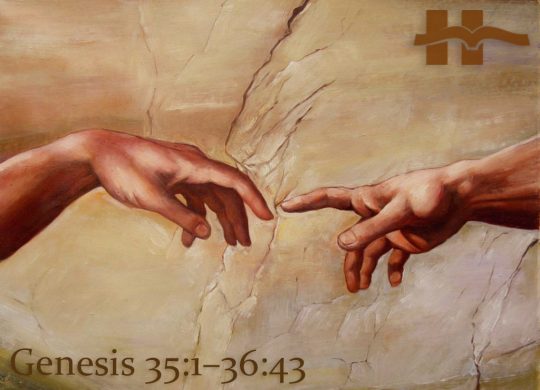Genesis 35:1−36:43

The blessings of God fulfilled in the past, promotes worship of God that, in turn, continues the cycle of divine blessings for the future.
This section forms the formal conclusion to the Jacob Story that began in Genesis 25. Here, we see a collection of scattered accounts (Genesis 35) along with a closing genealogy (Genesis 36).
The structure of Genesis 35 is a travelogue of Jacob and his camp from Shechem to Hebron, a severance of the marked by four burials—three actual (of those who died, noted earlier), and one symbolic, and we’ll focus on the latter.
One of the key elements of this chapter is the reappearance of God to Jacob and the reiteration of divine blessing upon him (35:1, 9–11). Yahweh had certainly been God to Jacob as he had promised in Gen 28:13–15; the problem here was that Jacob was not making Yahweh his God as he had promised he would (28:20–22). This was an important act that needed to be done, a keeping of Jacob’s prior promise to God. Jacob realizes, perhaps guiltily, that God had kept his part of the bargain, but he, Jacob, had not; it was his turn now.
Thus, Genesis 35 can be divided into three sections: God’s command/reminder to, and Jacob’s assent/preparations for, worship (35:1–4); the engaging in worship of God (35:5–15); and the terminus of Jacob’s journey, his arrival at the side of his father (35:16–29). In a sense, Jacob’s journey is only complete after he has kept his promise to God to worship him for what he had done for him. God’s word had now been fulfilled to Jacob, and the latter, in turn, was reminded to keep his vow to the former (28:3–15, 21; 31:3, 13; 32:12 and 35:7, 14). And Jacob complies; God’s word (35:1–2) is precisely followed by the patriarch (35:3–4). And part of this involved the putting away of foreign gods that Jacob’s caravan had accumulated over the years (35:2–4). Jacob clearly recognized the implications of worshipping God (35:1), and the ramifications of keeping his word to recognize Yahweh as his God (28:20–22): no other God, but Yahweh.
The alacrity with which Jacob and his tribe follow God’s command, cleansing themselves and departing for Bethel, is accompanied by a divinely induced terror that falls upon the surrounding Canaanites (35:5). One cannot but think that this terror felt by the peoples around was not fear of Jacob, but rather fear of God, the result of Jacob’s own fear of God and his submissive response to divine command. God keeps his word and protects his own.
Subsequently, in response to Jacob’s obedience at Bethel, God appears to Jacob and blesses him again, this time with a comprehensive blessing that covers name, seed, nation, royalty, and land (35:10–12)—appropriate enough for the closing pericope of the Jacob Story. This is the crowning declaration of God to Jacob, an affirmation he looks back upon in 48:3–4.
And so, once again, in response to the (re)blessing by God, Jacob worships, this time, as he does in Genesis 28, before said current blessings are fulfilled (35:14–15). And so the cycle of promise → worship (before fulfillment) → promise fulfilled → worship (after fulfillment) → promise … continues again, with Jacob now worshiping again (before fulfillment).
In sum, God had kept his word on the short-term promises of bringing Jacob safely back to the Promised Land; and now future promises are adduced—surely God would keep his word on those as well. And after this, no more will God “appear” to a human being in Genesis.











 Abe Kuruvilla is the Carl E. Bates Professor of Christian Preaching at The Southern Baptist Theological Seminary (Louisville, KY), and a dermatologist in private practice. His passion is to explore, explain, and exemplify preaching.
Abe Kuruvilla is the Carl E. Bates Professor of Christian Preaching at The Southern Baptist Theological Seminary (Louisville, KY), and a dermatologist in private practice. His passion is to explore, explain, and exemplify preaching.